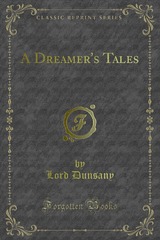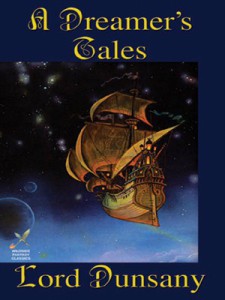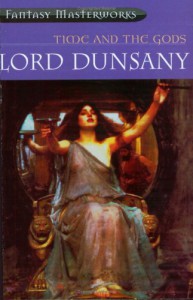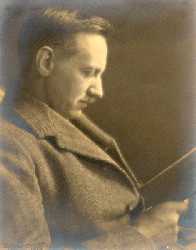Lord Dunsany Re-Read: “The Avenger of Perdóndaris”
Bill Ward and I are continuing with our Lord Dunsany re-read with a follow-up to one of Dunsany’s greatest, “Idle Days on the Yann.” Here’s a link to the Gutenberg edition of Tales of Three Hemispheres, one of Lord Dunsany’s later (and to my mind weaker) collections. Towards the very end of the collection are “The Avenger Of Perdóndaris,” which we discussed this week. As always, our rating system is simple. Any Dunsany story tends to be fabulous, so one star is a standout and two is something remarkable.
 Bill: ‘The Avenger of Perdondaris” almost seems to turn the previous story on its ear, in so far as the events in the Land of Dream really aren’t the point, it’s the “framing story” that has taken over. Our narrator wishes to go back to the Land of Dreams in order to learn the fate of the Elephant Hunter Singanee who set out to avenge Perdondaris, the city that was completely destroyed in “Idle Days on the Yann.” The method of the narrator’s return parallels that of “A House on Go-By Street,” though the curiosity shop and its proprietor have changed. Once in the Land of Dream we again meet of the witch who presides at the transition point — her “pearls before swine” dialog is amusing and perhaps also a little sad, for what artist hasn’t felt that way?
Bill: ‘The Avenger of Perdondaris” almost seems to turn the previous story on its ear, in so far as the events in the Land of Dream really aren’t the point, it’s the “framing story” that has taken over. Our narrator wishes to go back to the Land of Dreams in order to learn the fate of the Elephant Hunter Singanee who set out to avenge Perdondaris, the city that was completely destroyed in “Idle Days on the Yann.” The method of the narrator’s return parallels that of “A House on Go-By Street,” though the curiosity shop and its proprietor have changed. Once in the Land of Dream we again meet of the witch who presides at the transition point — her “pearls before swine” dialog is amusing and perhaps also a little sad, for what artist hasn’t felt that way?
Howard: I loved that bit, probably because I’ve seen it done before but never quite in that way. And I should say I agree with you that “Avenger” does feel like it turns “Go-By” on its ear. It’s a companion piece. It feels to me that these last two are much more closely related that either is to “Idle Days on the Yann.”
Bill: The details of the fabulous court of the Elephant Hunter are classic Dunsany, and he learns indeed that Perdondaris has been avenged — the great beast’s other tusk is now in fact the bridge over which one approaches Singanee’s palace (Interesting also that the first tusk was a door to a city — so both tusks occupy thresholds or crossing points). No one saw the struggle of Hunter versus Beast however, and Singanee himself will not speak of it, instead “his mighty deed was given to the poets and became their trust forever.” I wonder if these were different poets than those digging pearls and being flogged for their pains. The idea that the deed itself is perhaps more valuable in the imagination — since we are in the Land of Dream — than it would be as a literal or factual retelling, beautifully evokes the shared logic of dreams and myths. The entire sweep of Perdondaris’ destruction and avenging happens ‘off camera’ in these stories, and the hints we get build a real aura of mystery about the whole thing. They are dreams within dreams, things we can only imagine despite our journeying in the realm of imagination itself.
 But I think this story really says what it needs to say when Dunsany tries to return to London and takes a wrong door — he is far in the future, in a ruined and empty landscape. He finds that his boat moored in the Thames has rotted away — the mirror image of the Bird of the River in ‘Go By Street.’ His confusion and fear recollects the perils of madness in the Land of Dreams, and the entire episode — he of course finds his way to his proper time and place by backtracking — reinforces the witch’s statement that everything is an illusion, both Dream and ‘the fields we know.’
But I think this story really says what it needs to say when Dunsany tries to return to London and takes a wrong door — he is far in the future, in a ruined and empty landscape. He finds that his boat moored in the Thames has rotted away — the mirror image of the Bird of the River in ‘Go By Street.’ His confusion and fear recollects the perils of madness in the Land of Dreams, and the entire episode — he of course finds his way to his proper time and place by backtracking — reinforces the witch’s statement that everything is an illusion, both Dream and ‘the fields we know.’
For several stories now I’ve been wondering if Dunsany is conveying his fatigue with the fantastic. Being worked to death in ‘The Unhappy Body’ only to depict poets as being flogged in ‘Go-By’ and completely unappreciated (and, really, seemingly mindless) in ‘Avenger.’ In ‘Go-By’ he has difficulty finding his way back (giving up politics helped!) and, when he does, his Dreams are no longer the ones he sought. In ‘Avenger’ he knows true terror at the prospect of not getting back to his proper place, and several times expresses that he would be quite happy with the mundane world. Those notions of the author’s emotional journey over his career as a fantasist, and the other richly symbolic images and events of this trilogy of stories, renders these as tales that will no doubt reward additional readings. Two stars.
Howard: I’m definitely feeling that he’s weary of the fantastic, which would make sense given that we’re reading some of his later short stories. It’s a tone that wearies me just a little and I’m looking forward to digging back into his earlier work. I feel just a little like I’ve been listening to those road songs from rock bands. Perhaps you know the ones: “oh, here we are on the road and we’re rock stars, but life is hard.” Being a rock star probably isn’t all full of glamour like we imagine, but I’m not sure I want to hear rock bands complaining about it anyway. I think artists should commiserate with each other, not moan about it in public.That’s too harsh for what Lord Dunsany’s doing here, though. There are many moments of brilliance in such a short little story. I love the little lies that the narrator has to tell to explain some of the modern customs he has to follow, and the glimpse he has of one of the golden dragons, and the sapphires that are dumped over the cliff to feed them. I think the poets watching butterflies to find out where the pearls are may be one of my favorite bits, though. Lord Dunsany has a soft spot for those trying to craft prose and poetry (I think he probably refers generally to an “artist” when he writes “poet.”)
That of course the pigs don’t want pearls puts me in mind of one of Lord Dunsany’s greatest, “The Assignation:”
Fame singing in the highways, and trifling as she sang, with sordid adventurers, passed the poet by.And still the poet made for her little chaplets of song, to deck her forehead in the courts of Time: and still she wore instead the worthless garlands, that boisterous citizens flung to her in the ways, made out of perishable things.
And after a while whenever these garlands died the poet came to her with his chaplets of song; and still she laughed at him and wore the worthless wreaths, though they always died at evening.
And one day in his bitterness the poet rebuked her, and said to her: “Lovely Fame, even in the highways and the byways you have not foreborne to laugh and shout and jest with worthless men, and I have toiled for you and dreamed of you and you mock me and pass me by.”
And Fame turned her back on him and walked away, but in departing she looked over her shoulder and smiled at him as she had not smiled before, and, almost speaking in a whisper, said:
“I will meet you in the graveyard at the back of the Workhouse in a hundred years.”
 Bill: Oh wow. And you know, here we are, a hundred years later…
Bill: Oh wow. And you know, here we are, a hundred years later…
Howard: And Lord Dunsany’s still appreciated. I started to write “is still going strong” but I think he is more famed as an innovator than he is famed for being read, which is a real shame.
Next week Bill and I will be reading the first two entries from one of Lord Dusnany’s greatest collections (and then moving on through the rest of the collection from there): Time and the Gods. You can find a free copy of the book here and join in the discussion. Hope to see you! (Note that the lovely copy to the right is the omnibus — we’re just reading the ORIGINAL collection, although we recommend picking up the omnibus if you can find it, because it contains six of his eight fantasy short story collections.

0 Comments